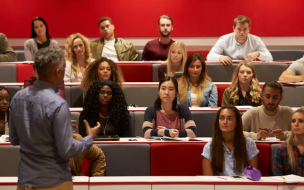I grew up in Cardiff, Wales where I attended Llandaff Cathedral School – the same school Roald Dahl happened to attend as a child. Just before high school I moved with my family back to Jeddah, Saudi Arabia. For college, I decided to venture off to Montreal, Canada.
Why did you choose to study Finance at undergrad?
I always had a certain talent for reading into numbers. But I love variety so I decided pretty early that accounting was not for me.
I found economics fascinating but too embedded in theory and ‘perfect world’ assumptions.
The more I delved into finance, the more I realized how the field is connected to politics, international business and society in addition to economics.
My desire to major in finance solidified while interning at the National Commercial Bank’s treasury department in Jeddah, Saudi Arabia.
You've worked at two established financial institutions - National Commercial Bank and Samba, what were the highlights and low points of these jobs?
My stint at the NCB was an eye opener. It was a rotational program where I was exposed to all the different desks in the treasury department.
I noticed how the treasury dealers were constantly up-to-date with global markets and executed trading, risk management or sales strategies based on current international events and their expectations.
Being a ‘global information junkie’ I found the whole process really appealing – understanding how businesses connect to the markets through commercial banks.
There was no low point other than just knowing that the firm culture was not one I personally identified with.
My time at Samba Bank was also a great learning experience. The Treasury Group there is highly innovative and the group treasurer is a charismatic and dynamic gentleman. I met some fantastic colleagues and clients and closed some pretty amazing deals.
As a derivatives sales officer I closed an FX deal with a Japanese automobile importer & distributor. I sold them a zero-cost structured hedging product that covered automobile purchases worth JPY 2.4 billion and as a result within a few weeks ended up saving the client over $300,000 in currency fluctuations. Going live in the dealing room was always a thrill.
The low point was the credit crisis. Volatility takes a toll on anyone working closely with the markets and I was no exception.
Why did you decide to do an MBA?
I chose to do an MBA for three reasons: to learn more about the management of international business, to enhance my leadership and managerial skills and to keep my broader career options open. Initially I was pursuing a CFA qualification, but halfway through, I decided I wanted to reconnect with global businesses.
Why did you choose Washington DC for your MBA?
My goal was to get into a top 20 school and take things from there. However, my GMAT score did not help my cause so I thought that if I were to spend two years of my late twenties studying full-time I had better spend them in a city where I could gain, not just a degree, but an experience.
DC is a great place for an MBA student. In addition to all the political landmarks, it’s home to the World Bank, the IMF, the Brookings Institution, and a plethora of embassies and prominent think tanks.
It’s as if every other week there are discussions that touch on profound topics: the global economy, the role of policy in international trade and alternative energy. to name a few, by the great minds of academia, business and politics.
There is a certain pulse that runs through DC and sometimes one must appreciate just being there. It’s a very classy, clean and pretty place.
Why The GW School of Business?
GWSB is well known for its international business program. It has been boosting its focus on sustainability – another personal interest – and has been praised for its emphasis on business ethics.
In addition, the School offers a mandatory global residency. This is a faculty-led consulting project where students are assigned to work on a real-life business challenge with an overseas firm. This year the residencies will be in Serbia, Vietnam, Brazil, Turkey, Sweden and Ghana.
Best experience at GWSB so far?
Although it’s early in the program, the best experience so far has been competing and winning a regional case competition. A group of four MBA students and I participated in a case competition organized by General Electric where we were given a current business challenge.
We were competing against the University of Virginia and Carnegie Mellon University and took first place.
We were invited to the company’s headquarters in Connecticut in November to present to the firm’s executives along with other winning MBA schools.
Most interesting class or professor?
So far the most interesting class for me has been Global Perspectives taught by Professor Anu Phene.
What are you hoping to do after your MBA? Do you plan to return to Saudi Arabia?
Eventually I plan on returning to the GCC., but immediately after graduation I want to take my career to a more international level for a few years in the US, Europe or Asia. I’m looking at financial consulting and international development. Old habits die hard so I also see myself in capital markets - structuring or sales - or in private equity.
Any advice for foreign business students who might be interested in working in Saudi Arabia?
There is plenty of opportunity in Saudi Arabia. Since it joined the WTO it really has expanded commercially. King Abdullah has been visionary in leading the Kingdom in new directions by investing in economic cities, research-based institutions and higher education. Foreign-educated managers are valued and are generally paid pretty well.
However, I would advise people considering moving there to understand that the culture is very conservative. Some might not feel comfortable with that kind of lifestyle.
What many foreigners tend to do is work for international firms in surrounding GCC countries that conduct business with the Kingdom. In terms of growth, the petrochemical, financial services, health and pharmaceutical and consumer goods sectors are hot.
RECAPTHA :
06
46
ee
83







